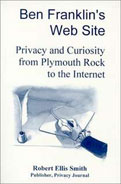 |
Ben Franklin's Web Site: Privacy and
Curiosity From Plymouth Rock to the Internet by Robert Ellis Smith Privacy Journal
book review by J. Alpha
"The Internet is, in many respects, much like a real city—truly a global village. It has a highly efficient postal system—much better than any one nation's—-although we must remember that the online system does not provide a level of security even close to that of a first-class letter. E-mail has a level of confidentiality closer to that of a postcard."
Now in its second printing—and featuring changes in privacy laws and corporate practices since September 11, 2001—Ben Franklin's Web Site by Robert Ellis Smith is a practical, informative, and engaging look at American laws and the American mind-set, regarding privacy issues being secondary to public safety concerns.
Spotlighting the actions of average people and the public personalities that have propelled "the silences in traditional history" with regard to personal privacy, Smith's well-documented historical-style narrative provides an academic context for classroom use, while his stirring and personable tone adds enough entertainment appeal to draw a wide variety of readers.
In the years before the development of photography in the mid-1980's, even mirrors
were not universal in British and American home life. Imagine the realization that
for the first time the very essence of your being—your visage—could be captured
by someone else—used and controlled by someone else.
In addition to his thorough and logical presentation of the social history of American thoughts and feelings about privacy, Smith's introduction and common sense descriptions and explanations of the issues of privacy history, policy, and law lay a solid foundation for subsequent intellectual, as well as casual, debate.
The same Constitution that protects the right to remain silent gives unprecedented
protection to authors and news reporters to find out about other people and write
about them.
From the details of Puritan monitoring of Colonial New England, to the origins of wiretapping, credit reporting, sexual practices, social security numbers, ID cards, and the advent of the impact and new challenges to privacy brought about by the Internet and the World Wide Web, Ben Franklin's Web Site logicallyweaves America's intrinsic desires for solitude throughout pivotal developments, legal cases, and treatise related to privacy.
In addition to the book's treasure of great quotations that will appeal to readers across a wide range of ages and professions, Smith's comprehensive look at the past, present, and future perspectives on issues of privacy, concludes with a checklist for enhancing privacy protection via the entertaining premise of what Ben Franklin's web site would look like if he had had the opportunity to disseminate his practical advice and philosophical homilies across the World Wide Web. "Three men can keep a secret if two of them are dead" —Ben Franklin.
